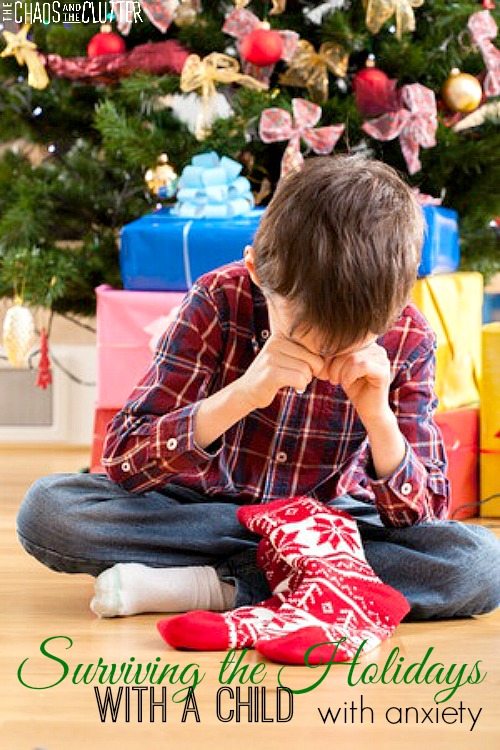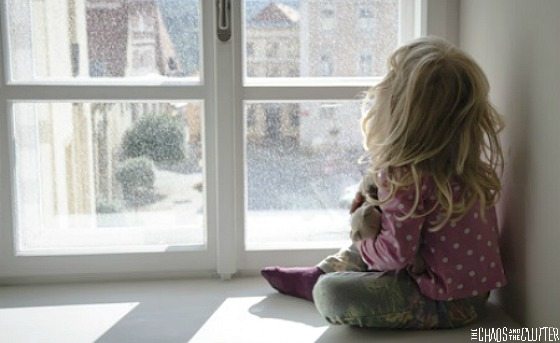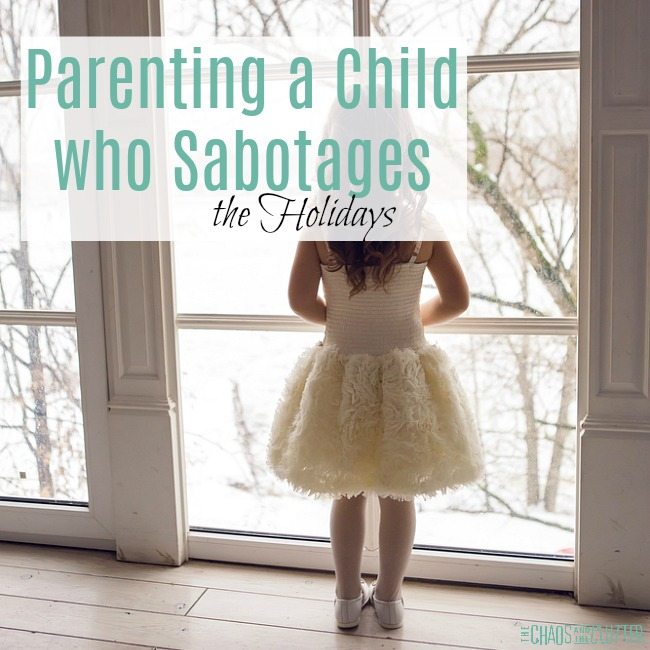Christmas used to be my favourite time of year. I embraced all of it, the decorating, the crafts, the baking, the get togethers, the festivities, even the shopping. In the past five years of so, Christmas has become more stressful. Several of our kids struggle with the holidays for various reasons. Some of our kids can’t help but to sabotage big days (you can read a bit more about why that is in this article about parenting kids who sabotage the holidays) while others find it challenging due to their sensory issues or anxiety.
Christmas is usually a time of excitement and fun for everyone, especially children, but for kids who struggle with anxiety, it can be a stressful time. Here are some suggestions on how to make holidays the best they can be.
 Image Copyright: bialasiewicz / 123RF Stock Photo
Image Copyright: bialasiewicz / 123RF Stock Photo
Talk to them about it.
Being up front with your kids about the possibility that their anxieties might be heightened during the holidays just makes good sense. One thing that can be very helpful to explain to children is how in our bodies, excitement and nervousness can feel the same. When we are excited, our stomachs can get butterflies, our heart rate can speed up, we can feel jittery and these are the same things our bodies feel when we are nervous. Teach them to take a moment when they recognize those signs and ask themselves “Am I excited or am I nervous?”. Doing this easy exercise can make a big difference. You may also want to tell them that it is normal to feel both excited and nervous at the same time.
Open a discussion with them about how they are feeling about the holidays. What worries or uncertainties do they have? What situations are most difficult for them? Is there anything that they are especially dreading? What parts of the holidays are they looking forward to?
Once you establish how they are feeling about the upcoming holiday preparations and festivities, remind them of their coping strategies. Encourage them and let them know that you believe in their abilities to handle this, but reassure them that you will be there to help them through.
Prepare them.
Children with anxiety often like being given as much notice as possible about what to expect. There are tools you can use such as charts or calendars to show them when the holiday events will occur. This should also be something you talk about with them ahead of time.
It is also helpful to explain in as much detail as you can what to expect at each event. How many people will be there? Will there be a gift exchange? (those numbered gift exchanges where people can steal gifts from others can be a nightmare for our kids with anxiety) Will it be a sit down meal or a less formal one where you make a plate and go sit down wherever? If so, where will your child sit? Will you help him get his food?
Will there be a Santa there? Decorations or lights that bother his sensory issues? Will there be games played? Will he have the option to sit out of the games or activities if they prove to be too stressful for him? How long will you stay?
It is also very helpful for some kids to know that there is a quiet place they can go if it all gets to be too much for them. Discuss with them where this might be. If it is at the home of a relative or close friends, perhaps there is a bedroom that he could go to for some quiet and to compose himself if need be. If it is at the home of someone less familiar or at a venue, perhaps the bathroom or your vehicle (with supervision depending on age) would be more appropriate.
Create a Christmas Calm Down Kit.
Make a calm down kit for or with your child. This can help them practise the calm down strategies that work for them. It will also ensure that they have the tools they need. You can see what we include in our Christmas theme Calm Down Kit. Create your own using the free printable relaxation prompts.
Role play.
The more prepared a child feels for a situation, the less anxiety they will feel. We role play all types of situations here. You can role play how to greet people at the gatherings, how to ask where the bathroom is, interactions with other kids, and anything more specific to the situations they will be in.
One game we like to play before the holidays every year is one that teaches our kids how to graciously receive and thank people for gifts. I place pictures I’ve cut out of magazines in envelopes. I choose some things they would want such as toys and books and some like underwear and socks and others like kitchen gadgets and practical things they wouldn’t want at all (pink doll for a boy or nose hair trimmer for a girl just to add some humour!). We then sit on the floor in a circle and the kids “open” their gifts. As I hand them the envelope, I tell them who it is from and they then say what they would say to thank that person. I teach them that the reply has to be honest and positive and has to include a thank you. Teaching my son with Aspergers how to say something honest about it wasn’t difficult, but honest and still positive took years of practise for him!
An example would be a boy who “opens” a picture of a pink doll from Grandma. He would then say “thank you Grandma. I will be able to use this to play with my sister.” Another would be a child who “opens” the nose hair trimmers…”thank you Uncle Matt. I will share these with my dad!!!”. We’ve had a lot of fun with this role playing game over the years. On Christmas, some of the practise will fly out the window with the excitement and chaos, but some of it will stick.
Say no.
The holidays is a time where the calendar can be overwhelming even to those without anxiety. Invitations for tobogganing parties, carolling, work functions, cookie exchanges, year-end gatherings, family outings, concerts, church events, parties with friends, and more can create quite a busy month. Carefully consider the invitations and then say “no” to some of them. You may even have to say “no” to most of them.
One of our invitations this year was to an adoption agency Christmas party where there was going to be a Santa and we would have had to bring wrapped gifts for each of our kids. Santa would have been something that caused anxiety for one of my kids, comparing their gifts to the gifts of others would have been a major trigger for another, and finding time to shop for and wrap at least five extra gifts (as well as paying for them) would have caused me stress, so that was an easy “no” for me.
Consider what your kids can handle, what types of things they find stressful and use those factors to make decisions about your holiday schedule. There will of course be some events that may not be as optional, but cutting out those that are can make those that are obligations less stressful too.
 Image Copyright: katarinagondova / 123RF Stock Photo
Image Copyright: katarinagondova / 123RF Stock Photo
Maintain routine.
It is more important during the holidays than ever to keep the routines intact. Routines are critical for a child with anxiety to feel some sense of control and peace. There will be nights when you are out and can’t keep to the regular bedtime, but when you are home, stick to the routine. Keep bedtimes the same. Keep mealtimes the same. If there is a certain schedule you normally keep, stay with that during the holidays.
For kids who are used to going to school, not having school to go to can throw a wrench in the routine for them. You can lessen the effects of this by having them wake up at the regular time and go through the morning routine of eating breakfast, getting dressed, brushing teeth, making beds and then choosing an activity that is low stress for your child. Perhaps that is schoolwork or something artistic or perhaps it’s playing outside. Since we homeschool, when I see that the lack of routine over the holidays is throwing my kids off, I will sometimes choose to toss a couple of school days into the holiday week just to get them back on track. It works really well.
Give them choices.
There are of course things that are non-negotiable and expectations that you will still have of your child over the Christmas season, but give them control over a few things. Allow them to choose things that they will see as important such as whether to open gifts before breakfast or after breakfast on Christmas morning. Also give them less important decisions such as whether to wear the red shirt or black shirt to the church service or where to hang their stocking.
Observe them.
You know your child. Watch them for signs that they are becoming too anxious. Listen to the signals they are sending you and earn their trust by acting on those. If you see that they are not able to cope at all in a certain situation, position yourself close to them and remind them of some coping strategies. If you see they are continuing to escalate, it may be time to head home early or take them outside for a walk to give them a break.
Focus on Health.
Christmas chocolates, baking and candy are not part of the Healthy Eating Guide! Be sure your child is getting proper nutrition even through the holidays. Even more critical than that, be sure they are well hydrated. Drinking water helps with anxiety and improves brain function at the best of times, so it is even more important during stressful times. Sleep is another factor to really pay attention to. All of these things contribute to easing anxiety and lessening the chance of meltdowns.
Bring comfort with you.
If your child has a special blanket or stuffed animal that they take comfort in, bring it with you to holiday events. You can also bring sensory balls that they can squeeze when feeling anxious or other items that help them calm down. We have made an anti-anxiety kit for our daughter and many of the items from that can be brought with us anywhere.
What tips do you have for making the holidays less stressful for your kids?
If you feel that your child is trying to sabotage the holiday season, read this.
I’ve really enjoyed participating in a series with other special needs moms about surviving the holidays. Be sure to read their tips and experiences as well.
Surviving the Holidays with Special Needs | Natural Beach Living
Free Christmas Visual Schedule for Kids | Every Star is Different
Navigating Trauma and PTSD Over The Holidays | STEAM Powered Family
Holiday Myths & Autism | My Home Truths
Visual Christmas Schedule for Special Needs Kids | Life Over C’s
Surviving the Holidays with a Child with Anxiety | The Chaos and The Clutter
Questions Special Needs Parents Face During the Holidays | This Outnumbered Mama
26 Holiday Survival Tips for Autism Families | And Next Comes L
The Year That I Made Santa Claus Cry | Kori at Home
Conquering the Holidays: They Don’t Need to be Perfect | 3 Dinosaurs
Why I Canceled Christmas: What You Need to Know about Surviving Holidays | Carrots Are Orange